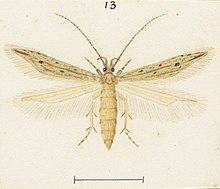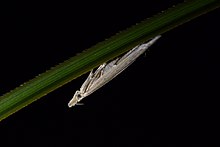Megacraspedus calamogonus
| Megacraspedus calamogonus | |
|---|---|

| |
| Illustration of male | |

| |
| Illustration of female | |
| Scientific classification | |
| Domain: | Eukaryota |
| Kingdom: | Animalia |
| Phylum: | Arthropoda |
| Class: | Insecta |
| Order: | Lepidoptera |
| Family: | Gelechiidae |
| Genus: | Megacraspedus |
| Species: | M. calamogonus |
| Binomial name | |
| Megacraspedus calamogonus Meyrick, 1885 | |
Megacraspedus calamogonus is a moth of the family Gelechiidae. It was described by Edward Meyrick in 1885.[1][2] It is endemic to New Zealand.[3]

The wingspan is 10–16 mm (0.39–0.63 in). The forewings are whitish-ochreous, with the veins sometimes slightly infuscated. There is a dark fuscous dot in the disc slightly before the middle, a second very obliquely before it on the fold, and a third in the disc at two-thirds. There is also a short fuscous apical streak. The hindwings are whitish.[4]
Larvae of this species feed on the flowers and seeds of grass and sedge plants.[5] Hosts include Austroderia richardii, Chionochloa flavescens, Chionochloa macra, Chionochloa pallens, Chionochloa rigida and Chionochloa rubra.[6]
References
- ^ "Megacraspedus calamogonus Meyrick, 1885". nzor.org.nz. Landcare Research New Zealand Ltd. Retrieved 2018-07-10.
- ^ Edward Meyrick (November 1885). "Descriptions of New Zealand Microlepidoptera. Gelechiadae. VIII. Tineina (part)". New Zealand Journal of Science. 2 (12): 589. Wikidata Q108097450.
- ^ Savela, Markku (ed.). "Megacraspedus". FUNET. Retrieved 6 July 2020.
- ^ Edward Meyrick (May 1886). "Descriptions of New Zealand Micro-Lepidoptera". Transactions and Proceedings of the New Zealand Institute. 18: 163. ISSN 1176-6158. Wikidata Q109405465.
 This article incorporates text from this source, which is in the public domain.
This article incorporates text from this source, which is in the public domain.
- ^ "PlantSynz - Invertebrate herbivore biodiversity assessment tool: Database". plant-synz.landcareresearch.co.nz. Retrieved 2018-07-10.
- ^ "PlantSynz - Invertebrate herbivore biodiversity assessment tool: Database". plant-synz.landcareresearch.co.nz. Retrieved 2018-07-10.
